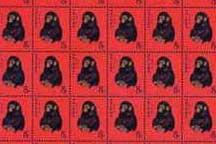Watch Video

 Play Video
Play VideoThe market for rare and collectable stamps in Asia is heating up despite the recent global financial crisis. The price hike can be attributed to the Chinese buyers in mainland who are happy to pay hundreds of thousands of dollars for stamps they see as a good investment. Now, let's take a look at a couple of examples some people would pay big money for.
At one point, five-million of them were thought to exist, but their price per ounce was more than gold at the Zurich Asia Auction in Hong Kong.
This sheet of Red Monkey stamps was sold for 160-thousand US dollars to an undisclosed Asian collector at last Sunday's Zurich Asia auction in Hong Kong.
Issued in 1980, they mark the highly auspicious year of the Golden Monkey that comes around only once in 60 years in the Chinese Zodiac.
The growing wealth of the Chinese mainland new middle class has seen a boom in collecting - and record prices.
Anna Lee, at Hong Kong's Philatelic Society, acknowledges that investment in stamps from the Chinese mainland is "speculative," and often not the work of real stamp collectors.
Anna Lee said, "Stamps are definitely a good form of investment, but you have to have the knowledge. Stamps are a little one-inch piece of paper, and sometimes even tatty-looking. But, the value is in its history, you know. You have to enjoy stamp collecting, you have to have the cultural background or whatever, you have to know the history aspects, before you understand it."
She points out that stamps of lower value are repackaged as gift sets in the Chinese mainland, commanding a much higher price based on appearance only.
Major international auction houses like Sotheby's and Christie's have so far concentrated their stamp sales outside of Asia, but renowned British stamp trading company, Stanley Gibbons, has said that it plans to open an office in Hong Kong later this year.
Stamp Collecting Supplies from www.boscastlesupplies.com
Source:http://english.cntv.cn/program/cultureexpress/20110819/105645.shtml